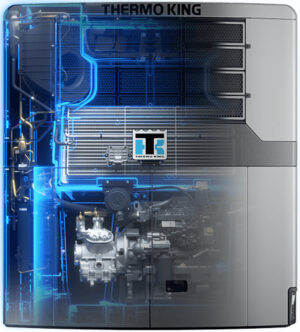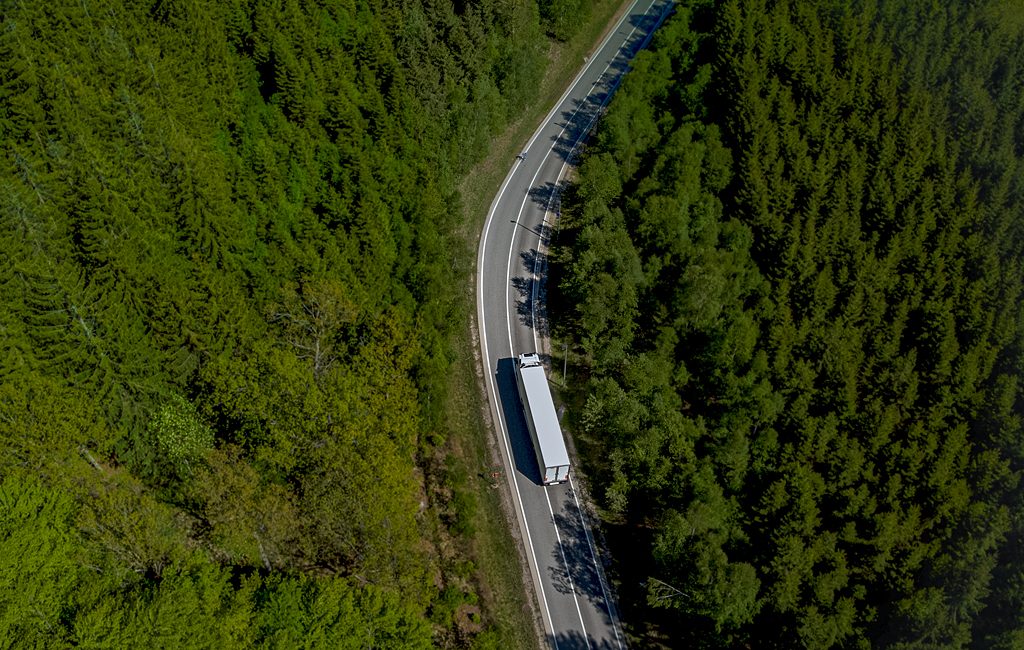Whether it’s frozen pizza, vegetables, or the finest salmon, the Advancer trailer cooling system from Thermo King ensures that all food is fresh and delicious when it arrives at the supermarket. Driven by its own engine, it always keeps the goods in the trucks at the right temperature. It offers the fastest cooling system currently available and operates almost a third more efficiently than the industry average. “When it comes to energy consumption, nothing else on the market can compare to it,” says Wayne Donnellan, senior engineer for refrigeration and air flow systems at Thermo King, with pride. “We have set new standards here.”
There is a reason for that: because the air flow is generated independently of the combustion engine, the customer can adjust the airflow of the evaporator to suit their exact load and needs. This protects the goods and reduces costs. The Thermo King’s Advancer Controller automatically adjusts the condenser fan speed depending on the cooling capacity and therefore maximizes fuel economy. For example, if the refrigeration unit is not operating at full load it automatically reduces condenser fan speed. The Advancer uses up to 30 percent less fuel than its predecessor.
“When it comes to energy consumption, nothing else on the market can compare to it. We have set new standards here.“
Wayne Donnellan, senior engineer for refrigeration and air flow systems at Thermo King
This is made possible by steplessly adjustable RadiCal DC fans from ebm-papst, which precisely cool the contents in the cargo area. Two fans are located in the evaporator and blow cool air into the trailer, two are located in the condenser and dissipate the heat produced by the cooling liquid to the outside. It sounds simple, but is in fact the result of many years of intensive project work. After all, when Thermo King contacted its longstanding partner, ebm-papst, five years ago with an inquiry, they had quite a different solution in mind.

The trailer cooling system Advancer uses up to 30 percent less fuel than its predecessor. There is a reason for that: because the air flow is generated independently of the combustion engine, the customer can adjust the airflow of the evaporator to suit their exact load and needs. (Photo | Thermo King)
Solution with DC instead of AC fans
Martin Münz, Head of Transportation at ebm-papst, was a sub-project manager in the technology department. He explains: “Thermo King envisaged a simple cooling system operated by high-voltage AC fans. However, we saw an opportunity to implement an innovative, future-oriented solution with DC fans here. The fans are exposed to vibrations, rapid temperature changes and humidity on the road, meaning that lower voltages are better suited here. In addition, DC fans are controllable and especially efficient.”
So, the team at ebm-papst developed an alternative solution using DC fans. They deliver a lot of power in the smallest space and save fuel thanks to reduced power consumption.
However, the engineers had to overcome a few hurdles during development. They had the right DC fans ready: 48-volt RadiCal DC fans were a good starting point. However, the desired solution stipulated an even lower power consumption. A motor that could do this and could also withstand the road conditions hadn’t been invented yet.
“The efficiency of RadiCal DC fans impressed us. We were also pleased that the fans were very compact and lightweight.”
Wayne Donnellan, senior engineer for refrigeration and air flow systems at Thermo King

Four RadiCal DC fans from ebm-papst are located in the Advancer and cool the contents in the cargo area precisely. (Photo | Thermo King)
So the developers got to work. The next challenge that awaited them was a lack of space in the cooling unit. To adapt the fans to the tight space, they had to design a smaller impeller for the fan that would do its job without losing efficiency or power. Of course, the new combination of motor and impeller also put other demands on the electronics that control everything. So the team adapted them for the new job. ebm-papst presented the prototype personally at Thermo King’s production plant in Galway in Ireland.
Wayne Donnellan from Thermo King explains: “The efficiency of RadiCal DC fans impressed us. We were also pleased that the fans were very compact and lightweight. This made handling them in the production process easier. The noise level was another important factor for us, as the newly developed trailer cooling system needed to be better than its predecessor. The noise level of the RadiCal fans in the standard product is already very low. With a FlowGrid air inlet grille, we can reduce it even further.”
Close partnership for development
With regard to the prototype, Thermo King still had some concerns that a few components might not be robust enough. Therefore, the electrical team at ebm-papst integrated protective circuits into the electronics, longer-lasting connector systems with gold-plated coatings and connector greases to make the fans even more durable and reliable. After all, reliability is the top priority for Thermo King.
It took around three years to get to the final product. Wayne sums it up: “It was a development based on partnership. Whether it was the motors, the voltage, or the arrangement of the fans, we discussed everything openly with ebm-papst. They understood our requirements and knew how to get the best out of their fans. Together, we were able to set new standards for trailer cooling.”

Leave a comment